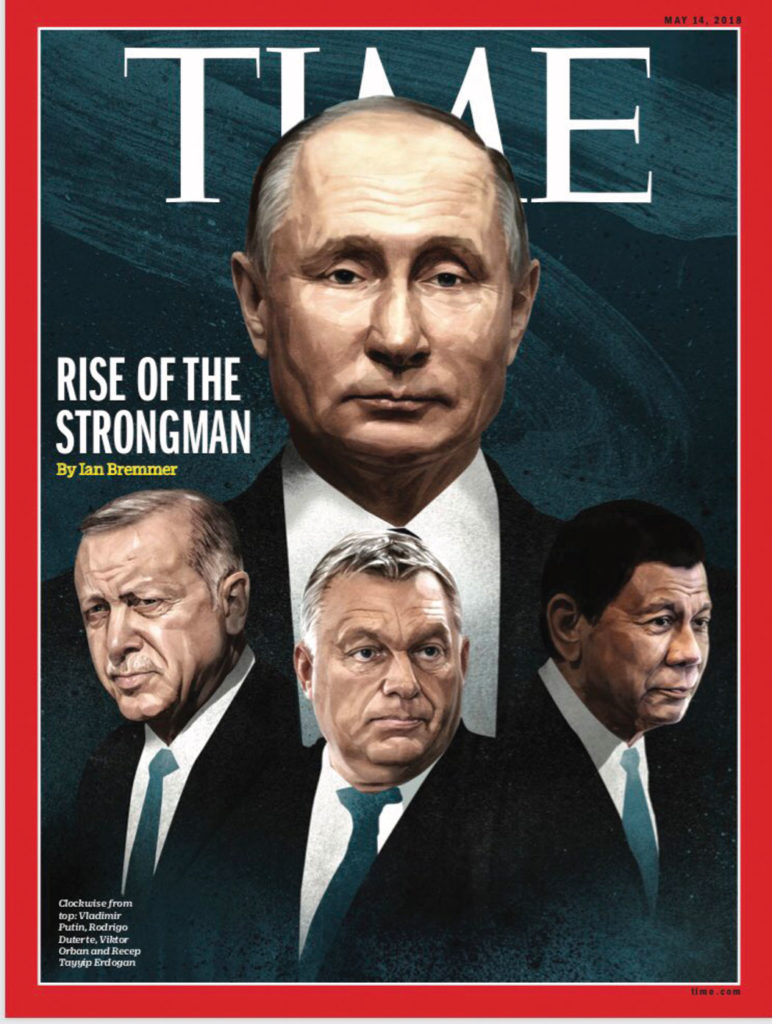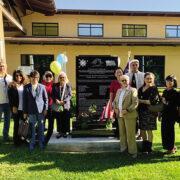
‘Strongmen era’ is here
Known for his tough rhetoric, Philippine President Rodrigo Duterte has been named among the world’s “strongmen” in an upcoming cover of TIME Magazine’s international edition, which will be released on May 14.
Alongside Duterte on the magazine’s cover are Hungarian Prime Minister Viktor Orban, Turkey President Recep Tayyip Erdogan, and Russian President Vladimir Putin.
The cover story written by Ian Bremmer, entitled “The ‘Strongmen Era’ Is Here. Here’s What It Means for You,” examines the rise of populism across the globe — not just “confined to the U.S.”
“In every region of the world, changing times have boosted public demand for more muscular, assertive leadership. These tough-talking populists promise to protect ‘us’ from ‘them,’” Bremmer writes. “Depending on who’s talking, ‘them’ can mean the corrupt elite or the grasping poor; foreigners or members of racial, ethnic or religious minorities. Or disloyal politicians, bureaucrats, bankers or judges. Or lying reporters.”
These populists with a more muscular, assertive leadership are hence called “strongmen.”
Bremmer noted that the most prominent strongman is Putin who “promised to wave away Western vultures that would pick Russia clean by making trouble in neighboring states like Ukraine.”
Strongmen can also be seen across Asia — China’s Xi Jinping, Thailand Prime Minister General Prayuth Chan-o-cha, and Duterte.
Duterte, who was elected in 2016, has been branded as a tough leader known for his uncompromising war against drugs. In the TIME article, he is described as “a former mayor who talked more like a Mob boss than a president,” who was elected based on “his promises to wipe out the drug trade with his own brand of justice.”
The TIME article further says that these strongmen “have won followers by targeting ‘them’…But they have succeeded because they know something about ‘us,’ or the people they’re speaking to. They understand the sense of threat — and they’re willing to exploit it.”
Unlike Germany’s Angela Merkel, France’s Emmanuel Macron, Japan’s scandal-plagued Shinzo Abe, and Britain’s Theresa May — who are all considered unpopular — strongmen are thriving with the public’s unwavering support.
“They’re usually the ones exerting that pressure, and their systems allow them to protect their advantages by changing the rules of the political game as needed. And nothing has made it easier for them to do so than advances in technology,” Bremmer wrote.
The cover story ends with Bremmer expressing concern over the rising number of strongmen across the globe.
“Perhaps the most worrying element of the strongman’s rise is the message it sends,” it reads. “Why emulate the U.S. or European political systems, with all the checks and balances that prevent even the most determined leaders from taking on chronic problems, when one determined leader can offer a credible shortcut to greater security and national pride? As long as that rings true, the greatest threat may be the strongmen yet to come.”
Though U.S. President Donald Trump was not included as one of the strongmen, the article acknowledges his “sincere admiration for the likes of Putin, Xi, al-Sisi and Duterte” and that he “knows well what his supporters want to hear.”
The idea of Western democracy is less appealing to the masses, Bremmer notes.
“Right now, some Americans think the U.S. is more urgently in need of structural political reform than China. That’s a win for the strongmen,” he writes.
The article concludes with “the most worrying element” of having these strongmen in power.
“Why emulate the U.S. or European political systems, with all the checks and balances that prevent even the most determined leaders from taking on chronic problems, when one determined leader can offer a credible shortcut to greater security and national pride? As long as that rings true, the greatest threat may be the strongmen yet to come.”
Duterte, Palace react to cover story
On Friday, May 4, Malacañang responded to the TIME Magazine cover as evidence of how Filipinos have appreciated Duterte’s leadership style.
“Regardless of slant, President Rodrigo Roa Duterte has demonstrated strong and decisive leadership – a quality appreciated by Filipinos as evidenced by the Chief Executive’s high satisfaction, approval, trust and performance ratings,” Presidential Spokesperson Harry Roque said in a statement.
Despite the international uproar over some of Duterte’s remarks since taking office nearly two years ago, Roque said, “Filipinos have learned not to take [Duterte] literally with his colorful language.”
The Palace said the Philippines’ war on drugs has been praised by international leaders and countries, including the U.S., China, and Indonesia.
“The president’s brand of justice strictly adheres to the rule of law where the dismantling of the drug apparatus ensures the proper investigation of all drug-related killings,” Roque said.
Meanwhile, on the same day, Duterte mentioned the “strongman” label during an event for school principals in Davao.
“Isa raw ako sa mga strongmen. Hindi naman ako strongman (I am supposedly one of the strongmen. I am not even a strongman). I have never sent anybody to jail for criticizing me,” Duterte said in his remarks.
He added that his vow to eradicate the drug problem in the Philippines was a “campaign promise ko ‘yan (of mine). I won the presidency. I have no machinery but I won by 16 million because I was the only one carrying the message that was appropriate at the time.”
The Philippine president previously made the cover of TIME Magazine in May 2016 with a feature entitled “The Punisher.” The following year he made the publication’s 100 Most Influential People list.






